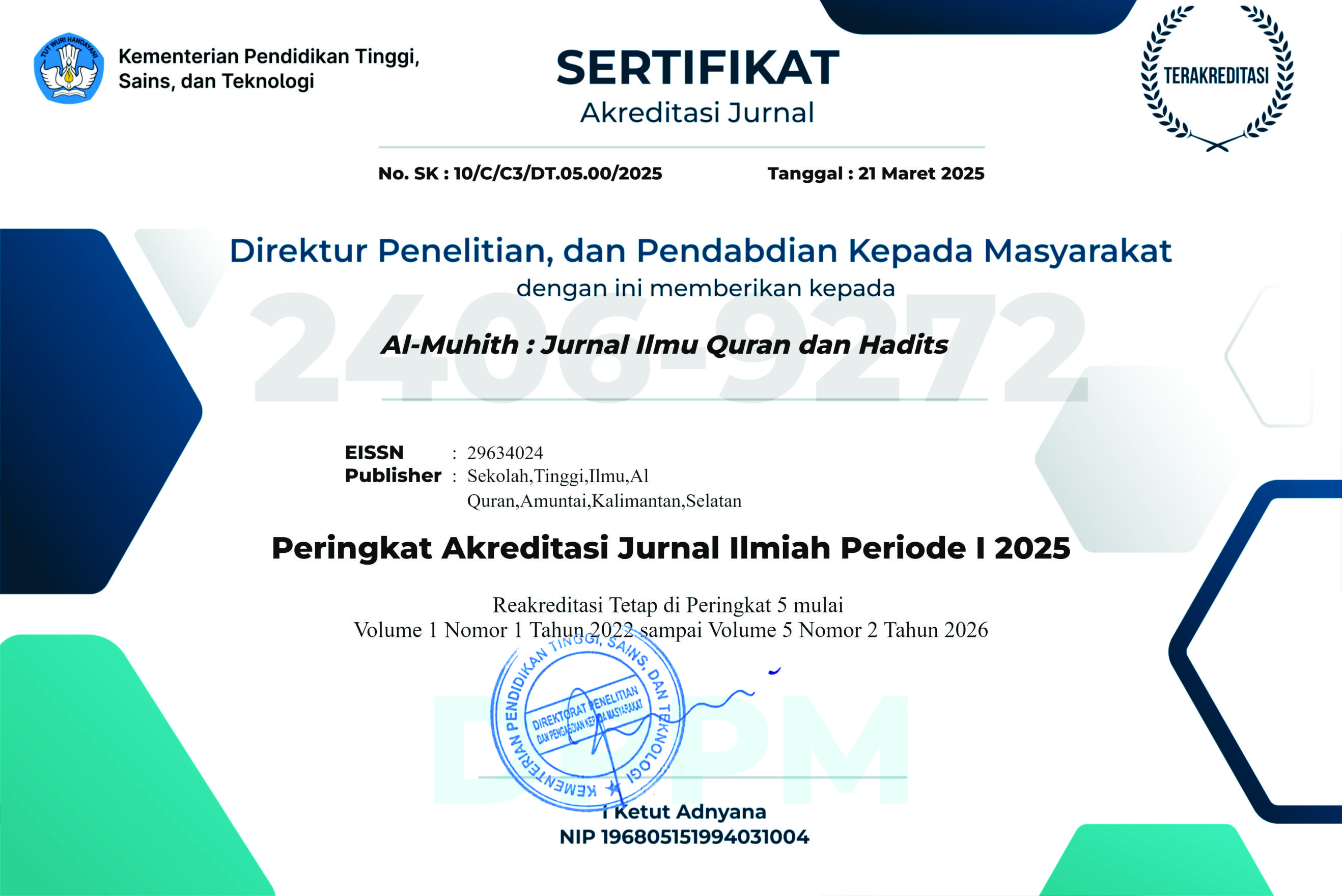- Focus and Scope
- Section Policies
- Peer Review Process
- Publication Frequency
- Open Access Policy
- Archiving
- Publication Fee
- Plagiarism Check
- Publication Ethics
Focus and Scope
Al-Muhith: Journal of Quran and Hadith Science accepts all articles related to Quran and Hadith science and those related to it. The published articles come from the results of field research and theoretical studies from academic circles on campus as well as observers and practitioners who have expertise in Quran and Hadith science.
Section Policies
Articles
Peer Review Process
Some policies in the review of Al-Muhith : Jurnal Ilmu Qur'an dan Hadits 1.Reviewers will review any submitted paper. 2.Review process employs a single-blind review, which means that both the reviewer and author identities are concealed from the reviewers, and vice versa. 3.In the review process, reviewers consider the correspondence of title, abstract, discussion (findings) and conclusions. Beside, reviewers also examine the novelty, scientific impact, and references used in the paper.
Publication Frequency
Al-Muhith: Journal of the Qur'an and Hadith published every 6 months / 2 times a year (July and December)
Open Access Policy
This journal provides immediate open access to its content on the principle that making research freely available to the public supports a greater global exchange of knowledge.
Archiving
This journal utilizes the LOCKSS system to create a distributed archiving system among participating libraries and permits those libraries to create permanent archives of the journal for purposes of preservation and restoration. More...
Publication Fee
The APC of this journal is Rp. 300.000
Plagiarism Check
Al-Muhith uses google scholar and plagscan checking before deciding whether an article is accepted or not.
Publication Ethics
Jurnal Ilmu Al-Qur'an dan Hadith is committed to maintaining the highest standards of publication ethics to ensure the integrity, credibility, and reliability of published scientific work. Authors, reviewers, editors, and all parties involved are expected to adhere to the following ethical guidelines:
1. Authorship and Originality :
Authors must ensure that the submitted work is original and has not been published elsewhere.
Each author must have made a substantial contribution to the research and writing of the manuscript and should be properly listed. Any person or organization that has made a significant contribution to the research must be acknowledged in the manuscript.
2. Plagiarism :
Authors must ensure that their work is free from plagiarism. Borrowed information or ideas must be properly cited. The editor will use a plagiarism detection tool to check for possible plagiarism, and appropriate action will be taken if found.
3. Integrity of Data and Results :
Authors are responsible for the accuracy and integrity of the data presented in their manuscript.
Falsification or manipulation of data is considered a serious ethical violation.
4. Multiple Submissions :
Authors should not submit the same manuscript to more than one journal concurrently. If a substantial part of the manuscript has been published elsewhere, it should be properly cited or referenced.
5. Peer Review Process :
All submitted manuscripts will undergo a rigorous peer review process to ensure the quality and validity of the research. Reviewers are expected to provide unbiased, constructive, and timely feedback to the authors.
6. Conflict of Interest :
Authors should disclose any potential conflicts of interest that might influence the research or its interpretation. Editors and reviewers should also declare any conflicts of interest and recuse themselves from the review process if necessary.
7. Ethical Treatment of Human and Animal Subjects :
Authors should adhere to ethical standards when conducting research involving human or animal subjects. Informed consent should be obtained from participants, and the research protocol should be approved by an appropriate ethics committee.
8. Corrections and Retractions :
If an error is discovered after publication, the author is obliged to promptly correct the error or notify the journal editor. In cases of serious ethical violations or misconduct, the journal may consider retracting the published article.
9. Editorial Independence :
Editors should make decisions based on the merit of the work, without any influence from commercial or political interests. Conflicts of interest among editorial staff should be disclosed and managed appropriately
10. Timeliness :
All parties involved, including authors, reviewers, and editors, must adhere to an agreed-upon schedule to ensure the timely publication of submitted manuscripts. Adherence to these ethical guidelines will help maintain the integrity of the Jurnal Ilmu Al-Qur'an dan Hadith and advance knowledge in the field. Violations of these ethical guidelines may result in appropriate action, including rejection of the manuscript, retraction of the published article, or reporting to the relevant institutions or authorities.



